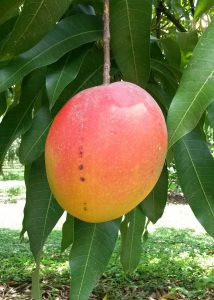By Clint Thompson
As predicted, Florida’s mango supply was severely impacted by the chilling temperatures experienced in January. Producers did not have the usual crop this season. University of Florida Institute of Food and Agricultural Sciences (UF/IFAS) researcher Alan Chambers was not able to conduct part of his research.

The plant geneticist at the UF/IFAS Tropical Research and Education Center in Homestead, Florida, discussed the impact the temperatures had on his research in South Florida.
“Unfortunately, I wouldn’t say we had a near total hiatus, but we certainly got a gap because most of our research was based on these seedlings and hybrid populations. Because there’s no fruit this year, we can’t make new populations. We’ve cleared out over two acres for mango seedlings, and we don’t have enough fruit to make the populations worthwhile. That’s got to wait for a year,” Chambers said. “We’re more focused on the genomics and genetics side of things so we can take a seedling and predict what it’s going to be like when it’s mature. But at the same time, we need fruit to validate those methods. We’re moving forward, but it’s certainly not at full capacity.”
Temperatures dropped into the 30s in South Florida during the latter part of January. The subsequent chill damage reminded growers about mango’s severe susceptibility to colder temperatures even if temps did not drop below freezing.
“Humans have a habit of pushing boundaries or pushing limits. We are growing tropical crops in a sub-tropical environment, and every now and then, the environment really lets us know who’s in charge,” Chambers said. “We didn’t actually get down to freezing temps, but it was chill enough to cause damage.”









